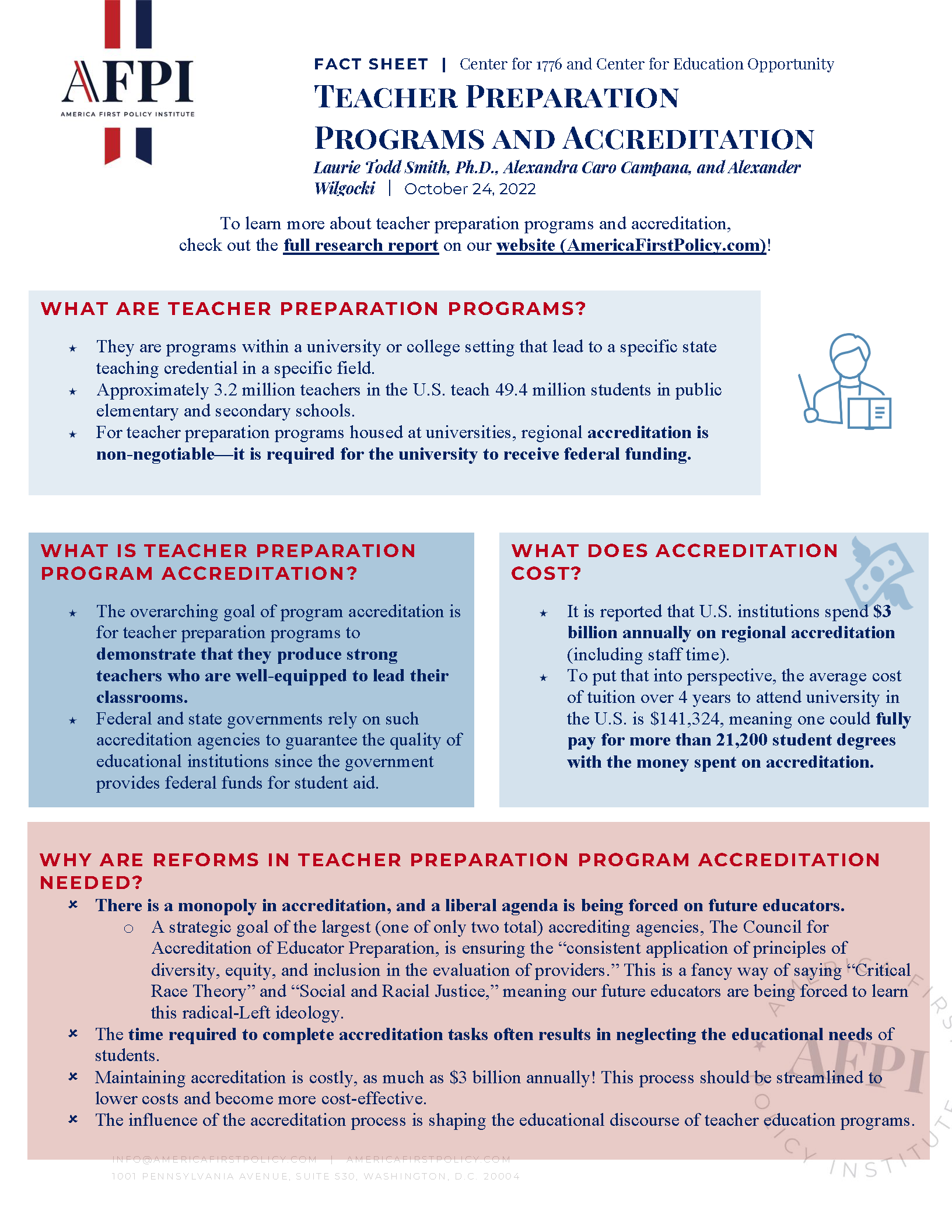Teacher Preparation Programs and Accreditation
Key Takeaways
For teacher preparation programs housed at universities, regional accreditation is non-negotiable—it is required for the university to receive federal funding.
The overarching goal of program accreditation is for teacher preparation programs to demonstrate that they produce strong teachers who are well-equipped to lead their classrooms.
It is reported that U.S. institutions spend $3 billion annually on regional accreditation (including staff time).
To learn more about teacher preparation programs and accreditation, check out the full research report on our website (AmericaFirstPolicy.com)!
What are Teacher preparation programs?
- They are programs within a university or college setting that lead to a specific state teaching credential in a specific field.
- Approximately 3.2 million teachers in the U.S. teach 49.4 million students in public elementary and secondary schools.
- For teacher preparation programs housed at universities, regional accreditation is non-negotiable—it is required for the university to receive federal funding.
What is Teacher Preparation Program accreditation?
- The overarching goal of program accreditation is for teacher preparation programs to demonstrate that they produce strong teachers who are well-equipped to lead their classrooms.
- Federal and state governments rely on such accreditation agencies to guarantee the quality of educational institutions since the government provides federal funds for student aid.
What does Accreditation cost?
- It is reported that U.S. institutions spend $3 billion annually on regional accreditation (including staff time).
- To put that into perspective, the average cost of tuition over 4 years to attend university in the U.S. is $141,324, meaning one could fully pay for more than 21,200 student degrees with the money spent on accreditation.
Why are reforms in teacher preparation program accreditation needed?
- There is a monopoly in accreditation, and a liberal agenda is being forced on future educators.
- A strategic goal of the largest (one of only two total) accrediting agencies, The Council for Accreditation of Educator Preparation, is ensuring the “consistent application of principles of diversity, equity, and inclusion in the evaluation of providers.” This is a fancy way of saying “Critical Race Theory” and “Social and Racial Justice,” meaning our future educators are being forced to learn this radical-Left ideology.
- The time required to complete accreditation tasks often results in neglecting the educational needs of students.
- Maintaining accreditation is costly, as much as $3 billion annually! This process should be streamlined to lower costs and become more cost-effective.
- The influence of the accreditation process is shaping the educational discourse of teacher education programs.
potential reforms state leaders can implement
- Review accreditation standards and policies that govern teacher preparation to ensure they are free of bias and aligned with the state’s vision for education.
- Recently, Florida Governor Ron DeSantis signed Senate Bill 7044, which requires all Florida public educational institutions to change their regional accreditor every 5 years. The new law is intended to help institutions stay in line with the priorities of Florida parents.
- Utilize state longitudinal data systems to measure teacher preparation program success. No compelling evidence suggests that program accreditation by National Council for Accreditation of Teacher Education or Advancing Quality in Educator Preparation leads to positive academic outcomes for students.
- States can transform education schools by focusing on student achievement as a primary measure of the teacher education program’s success.
- Delaware publishes report cards for preparation programs, including pass rates on performance assessments, number of completers and non-completers, average teacher evaluation ratings, employer/supervisor satisfaction, and retention. Programs receive renewal status based on this data.
- Implement teacher apprenticeships. Tennessee’s Teacher Occupation Apprenticeship program is the first K-12 teacher apprenticeship program registered with the Department of Labor, which means it has been vetted by the department and has been determined to meet high standards for rigor and quality.
- Additional innovation in teaching includes passing House Bill 2166 in Oregon in 2021. The bill provides $3.5 million to fund the establishment of alternative licensure programs that can operate without national accreditation for 4 years after earning state program approval.
- Mississippi is running a pilot of a performance-based licensure system that links educator licensure to classroom effectiveness ratings, and teachers pursuing this route do not need to complete a teacher preparation program.
- North Carolina is considering but has not yet implemented a system of performance-based career steps for teachers, starting with apprentice roles that do not require Teacher Preparation Program completion.
- Change the standard-setting process so that accreditation criteria reflect the needs of all stakeholders.
- Accrediting bodies should adapt and change policies to reflect the needs of local stakeholders, including employers and policymakers so that the definition of a quality education lines up with state and labor market priorities.
